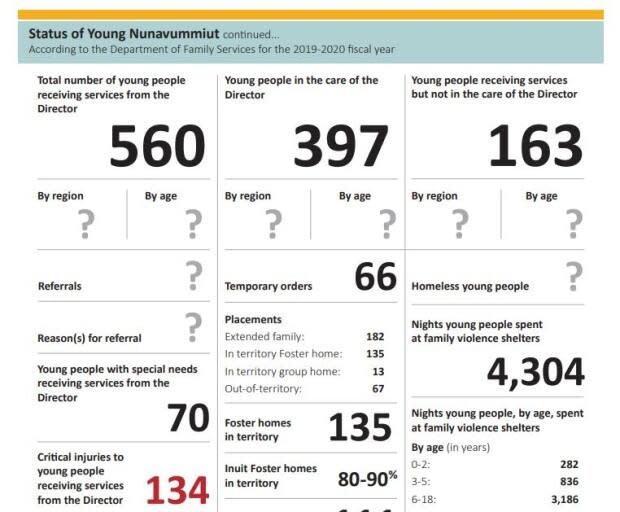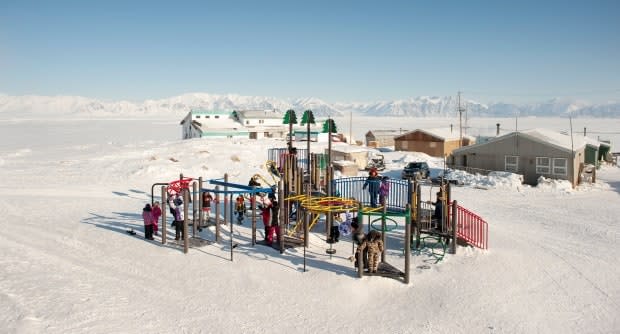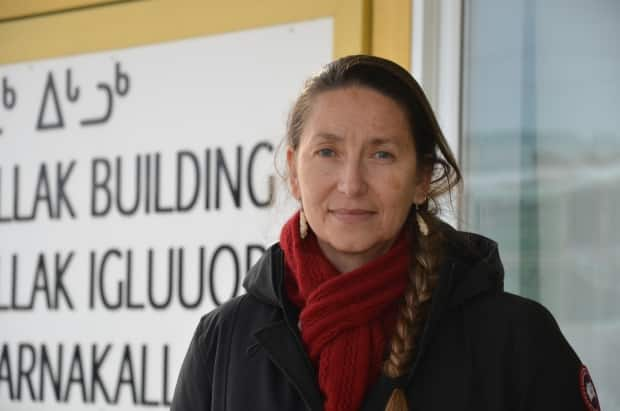Long-time Inuk social worker says abuse is normalized in Nunavut households
This is part three of a three-part CBC North series, The Small Abused. The series looks into reporting, prevention and support services available to children in Nunavut who are victims of abuse.
When social worker Maryanne Uluadluak is helping a child who has been abused, she treats the problems in front of her like the tip of an iceberg — there's always a lot more there than what you see on the surface, she says.
"When we talk about abuse, often there are other things going on. It could be, a parent is also being abused and the child is witnessing and going through the abuse themselves," says Uluadluak, from Arviat, who has worked with Nunavut's Department of Child and Family Services for 23 years.
All verbal, physical or sexual abuse can lead to other trauma within families, she said.
"There's a lot of abuse going on in the homes," she said. "There's more that we don't see or hear. It's very sad that this is a common thing happening in some communities, that it almost becomes normal."
In Nunavut, rates of child abuse are 10 times higher than in the rest of Canada, according to an Iqaluit-based child advocacy group, the Umingmak Centre.
The centre opened last year to bring together social workers, law enforcement and health professionals who are responding to disclosures of child abuse.
Around the same time, Nunavut's RCMP V Division launched a special investigation unit for child-related cases.
A year into the operation, these services found there's a lot of work to be done both within and outside of the capital city, Iqaluit.
Abuse rates by community don't exist, Family Services director says
But the territorial government doesn't have a clear understanding of where most abuse is happening and how many children are actually hurting.
National data available doesn't reflect the realities of social support in the North, says Arijana Haramincic, executive director of the government of Nunavut's Department of Child and Family Services.
While there are around 560 children receiving social support services from the Nunavut government, Haramincic says limited community resources, poverty and overcrowding in Nunavut mean that children are more likely to interact with the social service system.
Sometimes this could be for something as simple as a food voucher. If a family is struggling to look after their child and needs aid from the department, that doesn't mean there is purposeful neglect happening, she said.
"If we are then reporting our referral rate it can be misinterpreted as the rate of abuse and neglect," she said.
They feel no one will hear them. No one will believe them or it's very shameful. - Maryanne Uluadluak, Family Services social worker
Just over 300 Nunavut children are in foster care. This number is a better reflection of how many children have been reported as being unsafe in their homes, she said.
More positively, roughly half of those children are in the care of extended family members in their own community.
In June, the department started requiring staff to record when a social services call is related to child abuse. It's also developing a digital database to replace current manual reporting. The department hopes to have that running within of two years.
For now, data that exists for Nunavut is admittedly anecdotal and has been inconsistently tracked, says Haramincic.

'Violence and abuse is not only tolerated, it is accepted'
In a September report, Nunavut's Representative for Children and Youth Office criticized the government for this lack of reporting.
The representative, Jane Bates, who is tasked with identifying systemic barriers faced by youth in government services, says a lack of meaningful and measurable data about the number of child victims means no one is being held responsible for a solution.
"We have learned that what service was accessed and what service was provided is not being tracked accurately, consistently, or even at all," said Bates, in the Representative for Child and Youth Office's 2019-2020 annual report.
"By not acknowledging the problem and addressing it through a continuum of services, from prevention to intervention, and culturally-appropriate, Inuit-led treatment options for both victims and offenders, it sends the message, loud and clear, that violence and abuse is not only tolerated, it is accepted," Bates said.
The report also calls investigations by the Department of Child and Family Services "inconsistent" and says needed steps for reducing harm for clients aren't being taken, either because of a lack of resources for both victims and abusers, or because keeping families together was prioritized over safety.
"Child sexual abuse has been normalized for Inuit children," said Bates, citing this statement from a 2018 report by Pauktuutit Inuit Women of Canada.
"This is utterly unacceptable," said Iqaluit-Niaqunnguu MLA Pat Angnakak, who presented the report in the Legislative Assembly in October.
Pauktuutit's words echo what Uluadluak has seen.
One of the biggest challenges Uluadluak says she faces in the front-line work is knowing that people are choosing not to seek help, because they think there's no one to listen.
"They feel no one will hear them. No one will believe them or it's very shameful," Uluadluak said.
Other times a child might be protecting someone they love, she said.
In situations of family violence, she says there is a fine balance between keeping families together, and reducing the risk of future abuse.
"It's always important when we're working with the child's parents that we hear them, that we listen to them and see what's going on in the home," she said. "We want to work together to keep them together."

Government starts anew with abuse prevention
Last year, the Department of Child and Family Services hired a coordinator for child violence prevention to create and deliver child specific training for front-line staff and, to rewrite the government's child abuse response protocol.
That protocol, Surusinut Ikajuqtigiit: Nunavut Child Abuse and Neglect Agreement, was tabled in the legislature last week. Surusinut Ikajuqtigiit means "a group helping children."
The agreement lays out the roles each department and agency has in child abuse response and prevention and how information is shared between groups. It also promises to connect victims with elders and to create a committee that will meet twice each year to make sure the agreement is being acted on.
The government is also supporting four communities to create shelter programs and domestic violence supports in Baker Lake, Pangnirtung, Pond Inlet and Gjoa Haven, Nunavut.
Around half of the clients served at the territory's few existing family violence shelters are children, according to the department's 2018-19 annual report.
Social work curriculum at the Nunavut Arctic College is being updated to have more child-specific and mental health training. The changes will take around five years, says Fiona Buchan-Corey, dean for the wellness and business school in Cambridge Bay.
More Inuit providers
While community social worker positions are usually filled, staff turnover is high and having enough Inuit social workers who speak Inuktut is a challenge, says Haramincic.
"It is our ideal that we would have more Inuit providing services to Inuit families and Inuit children," she said. "That is the best way because you do have the cultural connection and immersion and cultural safety and competency along with the social work and child protection requirements merged together in one individual to provide the best service."
With nearly half of the population in the territory under the age of 24, Uluadluak says she is hopeful that young people from Nunavut will step in to these jobs to support other youth.
There's more to the job than child apprehensions, she says.
"There's moments where there is a happy ending, and a person is thriving. These are the good things that keep you going," she said. "That's what keeps me here."

Nunavut Youth who need help can call the Kids Kamatsiaqtut Nunavut Helpline at 1-800-265-3333 and visit http://nunavuthelpline.ca.
Families and children can also call the child welfare line, at 1-844-392-4453 (FW CHILD).
To report an abuse in your community, contact the RCMP or a community social service worker.


